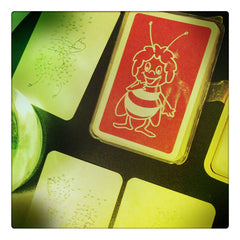Maya the Bee

She may be a little strange, but we love her.
Sometimes the things we loved as kids just seem bizarre now. Eating boogers, spinning around so fast you fall down, most of the candy from childhood. In comparison, Maya the Bee doesn’t seem all that strange.
Maya the Bee was an animated series made in Japan and originally broadcast from 1975 to 1976. The series was rebroadcast around the world and become a big hit. It was popular in Europe, South America, Asia and the Middle East, and was broadcast in over 40 languages. The show wasn’t seen in the US until the 1990s, but by then, Maya had appeared on bed sheets, mugs, books, comics and games, not to mention millions of school bags and pencil cases.
The kids in Europe might have already known Maya from the book The Adventures of Maya the Bee, published in Germany in 1912. Though relatively unknown in the US, the book inspired a film in 1924 (the first full-length film to star live insects) and an opera composed in 1963.
While the book introduces a lot of the elements that were seen in the animated series (plucky heroine, Maya’s bravery in saving the hive). It also includes a lot of elements that, a hundred years later, seem out of place in a children’s book.
As a member of a hive of honeybees (who don’t have parents, exactly), Maya is raised by The State. Her caretaker Mrs. Cassandra seems harried and stressed out, to say the least. That could be because Maya’s birth comes in the middle of a rebellion that the Queen is trying to crush. In the course of her adventures, Maya learns that individual thought is punished, humans are the highest form of life, fear is the same as respect and that loyalty to the hive and the Queen is valued above everything.
At the end of the book, Maya faces a moral dilemma the likes of which are not usually seen in bedtime stories: Maya must decide between saving herself or saving the hive but facing punishment for her crimes.
They’d cleaned up the story a lot by the 1970s. Gone were the threatening anger, blatant racism and glorification of the military. However, the moral – loyalty to the family – remained.
So why does Maya the Bee endure? The show is adorable. The designs are still fresh and appealing and the characters sweet and friendly.
Though today’s world doesn’t move with the buzz of The State as much as follow the Hive Mind of the Internet, it’s easy to see how audiences can still connect with Maya. We could use more plucky, independent thinkers like her in the hive.